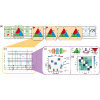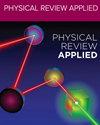Crosstalk suppression of parallel gates for fault-tolerant quantum computation with trapped ions via optical tweezers
IF 4.4
2区 物理与天体物理
Q2 PHYSICS, APPLIED
引用次数: 0
Abstract
The ability to perform entangling operations in parallel with a low error is essential for a large-scale fault-tolerant quantum computer. However, for trapped-ion systems, it is a challenging task due to the crosstalk resulting from the collective motional modes. Here, we develop a highly paralleled quantum circuit demonstrating a logical qubit based on the Steane code and study the impact of the crosstalk error on the performance of the fault-tolerant protocol. We show that the crosstalk indeed greatly destroys the fault-tolerant property of the quantum error correction. To achieve the break-even point with encoded qubits, we identify the suppression requirement of the crosstalk error to be less than for the Steane code. Furthermore, to mitigate the crosstalk below the fault-tolerant threshold, we propose a highly efficient optimization scheme by utilizing the programmable optical tweezer array. Overall, we make an elegant combination of the pulse-control optimization of parallel gate operations with the fault-tolerant protocol on the error-protected universal quantum computer.

通过光学镊子抑制并行门的串扰,从而利用受困离子实现容错量子计算
大规模容错量子计算机必须能够以较低的误差并行执行纠缠操作。然而,对于困离子系统来说,由于集体运动模式产生的串扰,这是一项具有挑战性的任务。在这里,我们开发了一个高度并联的量子电路,展示了基于 Steane 代码的逻辑量子比特,并研究了串扰误差对容错协议性能的影响。结果表明,串扰确实极大地破坏了量子纠错的容错特性。为了实现编码量子比特的盈亏平衡点,我们确定串扰误差的抑制要求小于 Steane 代码的 10-6。此外,为了将串扰降低到容错阈值以下,我们提出了一种利用可编程光镊阵列的高效优化方案。总之,我们将并行门操作的脉冲控制优化与容错协议在防错通用量子计算机上进行了优雅的结合。
本文章由计算机程序翻译,如有差异,请以英文原文为准。
求助全文
约1分钟内获得全文
求助全文
来源期刊

Physical Review Applied
PHYSICS, APPLIED-
CiteScore
7.80
自引率
8.70%
发文量
760
审稿时长
2.5 months
期刊介绍:
Physical Review Applied (PRApplied) publishes high-quality papers that bridge the gap between engineering and physics, and between current and future technologies. PRApplied welcomes papers from both the engineering and physics communities, in academia and industry.
PRApplied focuses on topics including:
Biophysics, bioelectronics, and biomedical engineering,
Device physics,
Electronics,
Technology to harvest, store, and transmit energy, focusing on renewable energy technologies,
Geophysics and space science,
Industrial physics,
Magnetism and spintronics,
Metamaterials,
Microfluidics,
Nonlinear dynamics and pattern formation in natural or manufactured systems,
Nanoscience and nanotechnology,
Optics, optoelectronics, photonics, and photonic devices,
Quantum information processing, both algorithms and hardware,
Soft matter physics, including granular and complex fluids and active matter.
 求助内容:
求助内容: 应助结果提醒方式:
应助结果提醒方式:


